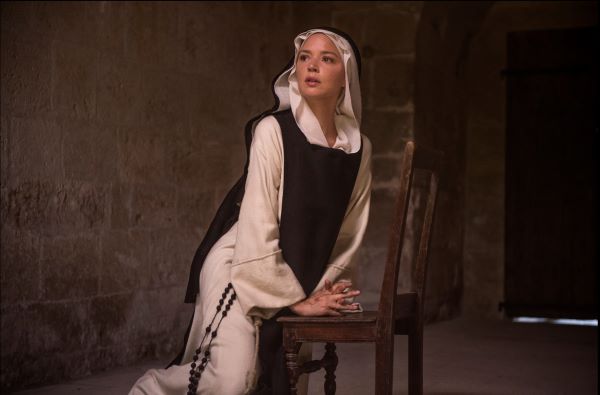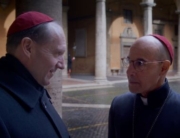America’s kinkier cineastes licked their chops at the news that veteran provocateur Paul Verhoeven was going to release a movie about lust and mania in a 17th-century Tuscan convent. Benedetta delivers on their gleeful anticipation. Featuring bizarre religious hallucinations, scarlet beheadings and whippings, and beautiful women breaking wind on the toilet when they aren’t having fabulous lesbian sex, the film fulfills its sensationalistic promise. Adding depth to the spectacle, though, are arresting performances and some tantalizingly ambiguous reflections on faith, power, and self-interest.
As a child, Benedetta Carlini clearly possesses something special. On her family’s trip to drop her off at the convent of the Theatines in Pescia, the girl enlists divine powers to force ruffians to return her mother’s stolen necklace. She then faces down the cynical, worldly-wise Mother Superior Felicita (perfect and perfectly cast Charlotte Rampling) and adapts to convent brutalities administered by variously damaged and sadistic sisters. Benedetta rapidly grows into a statuesque blonde, whose dark eyes can mist over with righteous faith or narrow in shrewd calculation. Virginie Efira’s glancing, quicksilver performance brings mystery to the charismatic yet gratingly self-righteous star within the convent’s drab walls.
A sexy Jesus rescues Benedetta in a series of wild hallucinations, and stigmata begin to bloody her hands. Even more dramatically, her sensual side flowers with the arrival at the convent of incest and rape survivor Bartolomea (feral, wild-eyed Daphne Patakia). These two begin a wanton relationship that will include a particularly sacrilegious pleasure toy.
As the sex and fantasy parts of her life heat up, Benedetta’s worldly stock rises in the convent. The comely nun’s religious visions give her a mystique among her fellow worshippers, and a meddling local priest with a beef against Felicita arranges for the Mother Superior to be deposed and Benedetta installed in her place, which Benedetta accepts as her due without a qualm. Felicita handles the change graciously, but not for long. She has dirt on Benedetta and her clinging, inseparable novice, and when she shares her intel with a corrupt papal nuncio (Lambert Wilson), a brutal power struggle is set in place. Betrayals pile up like the body count, and the onset of the plague places a deathly pall over the showdown.
As Verhoeven’s lurid, gory flights of fancy lead the movie in unpredictable directions, one grows to take them in stride. The fact that they are richly and fluidly shot definitely helps. More intriguing is the impetus behind Benedetta’s machinations. Is the nun a religious maniac, a true believer, or a stone-cold opportunist? Verhoeven and Efira keep us guessing. In the abbess, we believe we see moral principles behind a devious carapace—but do we? Are acts of faith real or simply a form of wish fulfillment for disappointed (female) souls? When Benedetta reassures the nuncio that she can foresee his future in paradise, he snarls back at her, “Always lying.” It’s a perfect rejoinder for a film that holds back from telling us where it really stands behind all the gorgeous and sexy activity in the foreground.







Leave A Comment